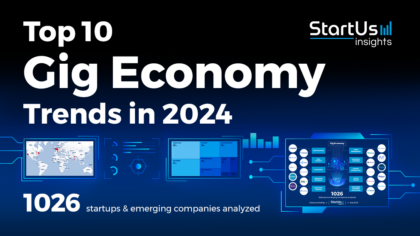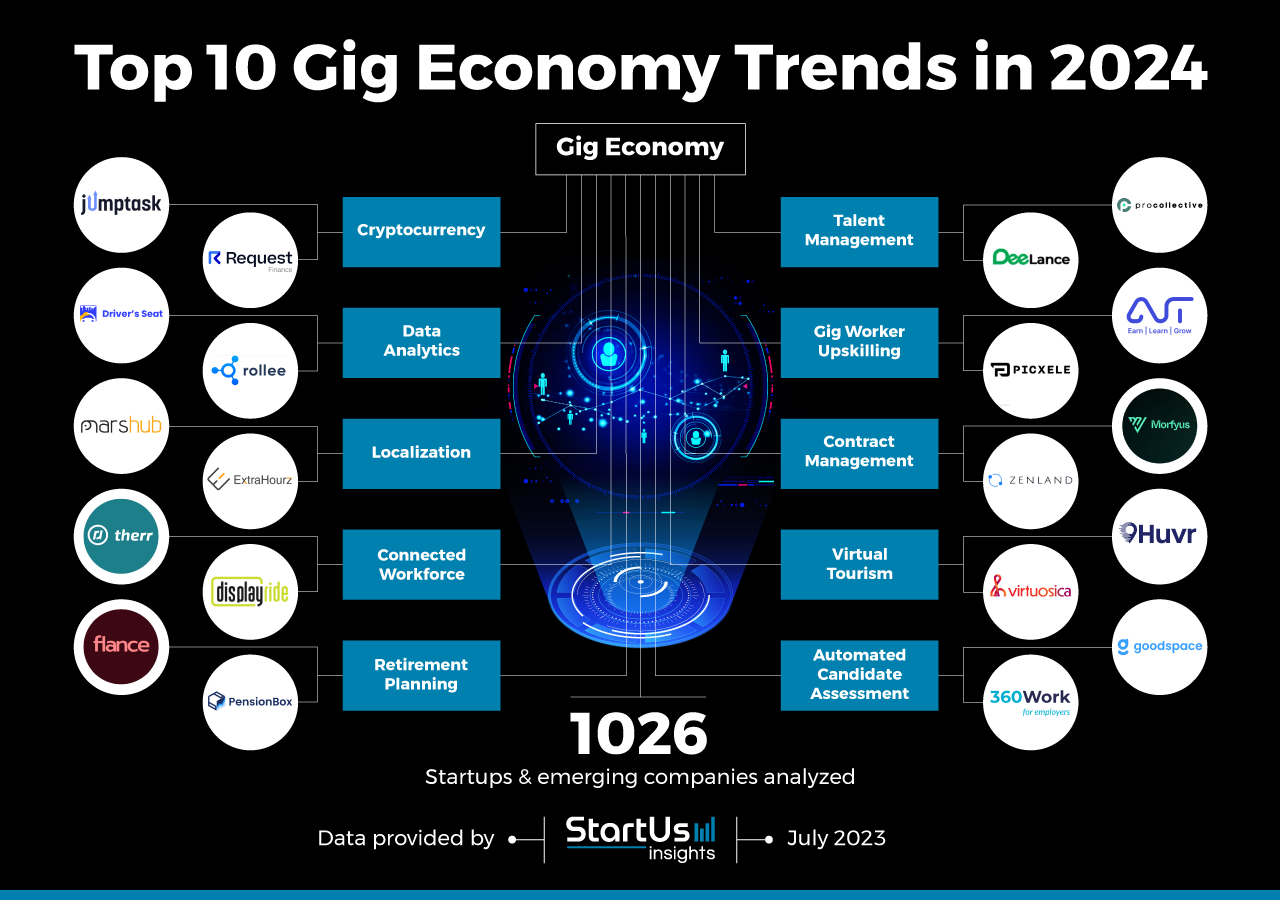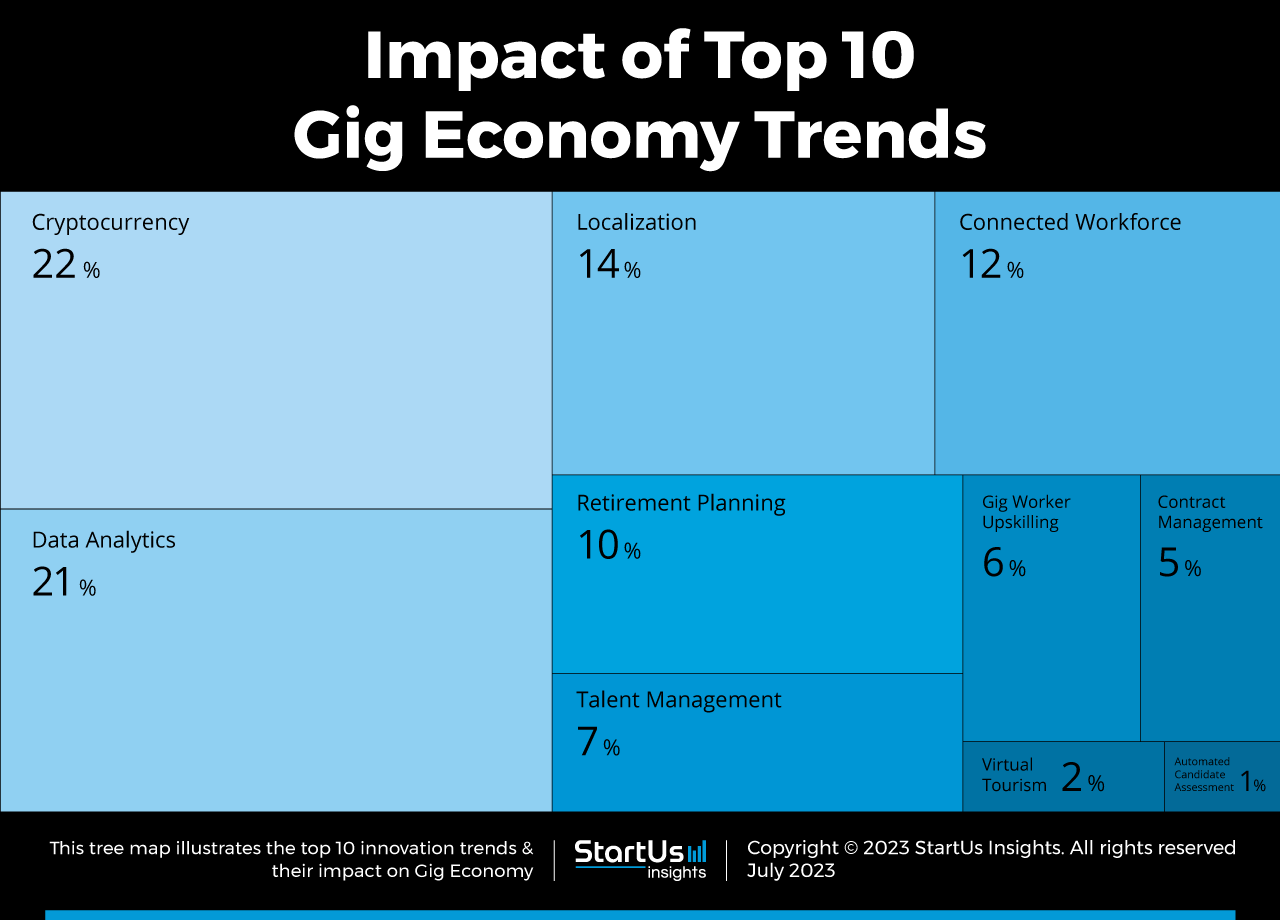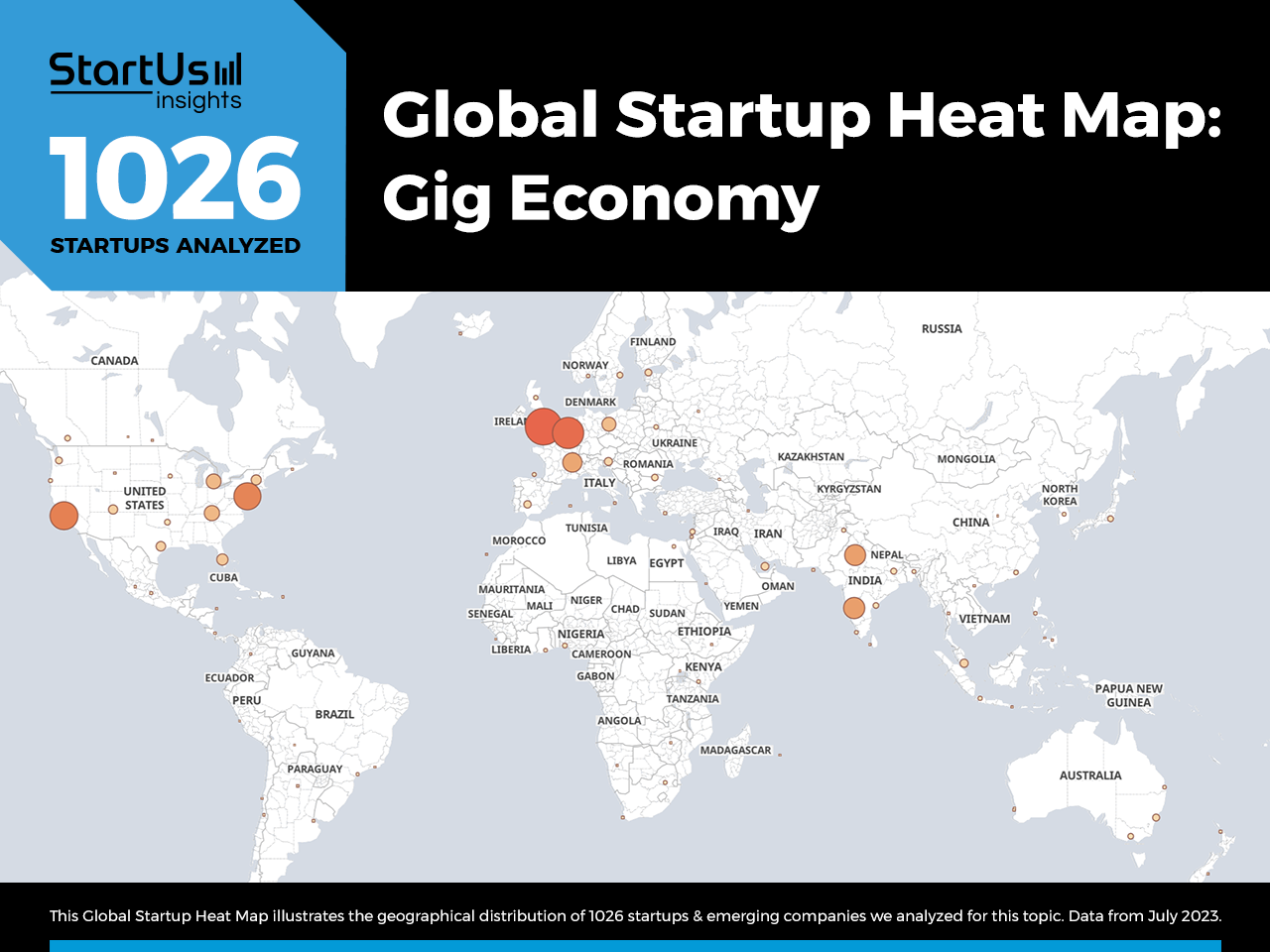Accelerate Productivity in 2025
Reignite Growth Despite the Global Slowdown
The COVID-19 pandemic has forced labor markets to drastically evolve with the help of technological innovations amidst economic uncertainty. The latest gig economy trends arise from various factors spanning job market uncertainty as well as rising inflation and costs of living. As a result, there is now a growing demand for both gig work and gig workers, also known as freelancers and independent contractors, depending on the situation.
In response to these shifting workforce dynamics, startups and scaleups are actively developing innovative solutions. By leveraging technologies such as artificial intelligence (AI), data analytics, and blockchain, companies are able to enhance security, boost productivity, and increase exposure for gig workers, globally.
Top 10 Gig Economy Technologies (2024)
- Cryptocurrency
- Data Analytics
- Localization
- Connected Workforce
- Retirement Planning
- Talent Management
- Gig Worker Upskilling
- Contract Management
- Virtual Tourism
- Automated Candidate Assessment
Innovation Map outlines the Top 10 Gig Economy Trends & 20 Promising Startups
For this in-depth research on the Top Trends in the Gig Economy & startups in the field, we analyzed a sample of 1026 global startups & scaleups. This data-driven research provides innovation intelligence that helps you improve strategic decision-making by giving you an overview of emerging technologies in the gig economy. In the Gig Economy Innovation Map below, you get a comprehensive overview of the innovation trends & startups that impact your company.
These insights are derived by working with our Big Data & Artificial Intelligence-powered StartUs Insights Discovery Platform, covering 3 790 000+ startups & scaleups globally. As the world’s largest resource for data on emerging companies, the SaaS platform enables you to identify relevant technologies and industry trends quickly & exhaustively.
Tree Map reveals the Impact of the Top 10 Trends in Gig Economy
Based on the Gig Economy Innovation Map, the Tree Map below illustrates the impact of the Top 10 Gig Economy Trends in 2024. Startups are developing advanced solutions to facilitate connections between gig workers and businesses. Using cryptocurrencies provides a reliable means of payment to secure global transactions between parties, while data analytics optimizes decision-making and performance through large datasets. Emerging companies are also focusing on localization and connectivity of the gig workforce to help them maximize their earnings.
Moreover, gig economy trends such as talent management as well as candidate assessment and upskilling enhance the efficiency of workforce allocation. They also ensure the perfect match between gig workers and opportunities. Further, novel solutions for contract management and retirement planning optimize freelance engagements and enable workers to access traditional employment benefits. Lastly, virtual tourism transcends geographical boundaries, enabling virtual tour operators to create unique experiences while reaching a global audience.
Global Startup Heat Map covers 1026 Gig Economy Startups & Scaleups
The Global Startup Heat Map below highlights the global distribution of the 1026 exemplary startups & scaleups that we analyzed for this research. Created through the StartUs Insights Discovery Platform, the Heat Map reveals high startup activity in the UK and the US, followed by the rest of Western Europe and India.
Below, you get to meet 20 out of these 1026 promising startups & scaleups as well as the solutions they develop. These emerging gig economy companies are hand-picked based on criteria such as founding year, location, funding raised & more. Depending on your specific needs, your top picks might look entirely different.
Top 10 Gig Economy Trends (2024)
1. Cryptocurrency
As the gig economy expands, independent contractors are experimenting with cryptocurrency as a more convenient, reliable, and borderless payment method. Startups develop solutions for gig workers to conduct secure global transactions, thus eliminating the limitations of traditional banking systems. The use of cryptocurrencies ensures transparency and security, therefore allowing gig workers and employers to instantly exchange transactions.
Further, startups offer decentralized payment or invoicing platforms for gig workers to receive payments in cryptocurrencies, directly to their digital wallets. Given these benefits, cryptocurrency forms the top trend in the gig economy by overcoming the issue of delayed remittances and centralized authorities as well as promoting financial inclusion.
JumpTask provides a Blockchain-powered Freelance Marketplace
JumpTask is an Estonian freelancer marketplace that leverages blockchain to connect employers with gig workers. The startup’s platform enables freelancers to generate income in the form of its crypto coins – $JMPT. Employers purchase $JMPT to reimburse freelancers in their digital wallets upon task completion. Further, JumpTask creates smart contracts to ensure secure and transparent transactions between both parties. The platform connects freelancers to earning opportunities from all around the world.
Request Finance develops a Crypto Invoicing App
French startup Request Finance provides a crypto invoicing app for freelancers to streamline the billing process. The app allows contractors to generate crypto invoices by significantly reducing billing time. The startup’s solution involves no middlemen and allows gig workers to bill companies in fiat money and receive crypto payments to digital wallets. The platform also allows users to track, verify, and organize all payment requests under a single visual dashboard.
2. Gig Economy Analytics
Data analytics is revolutionizing the gig economy by optimizing operations and decision-making. With data analytics solutions, freelancers gain valuable insights into market trends, optimize pricing strategies, and improve overall competitiveness. Startups innovate using technologies such as machine learning algorithms, data visualization tools, cloud computing, and big data processing tools.
Data analytics also helps gig workers identify the most profitable opportunities by analyzing a range of historical earnings and other relevant data. Using data analytics, gig employers accurately predict periods of high demand, enabling them to plan in advance for additional staff to meet the expected workload. Hence, this helps them optimize resource allocation, ensuring the right workers are assigned to the right tasks.
Driver’s Seat offers a Worker Performance-Tracking App
US-based startup Driver’s Seat equips gig drivers with a performance-tracking app to collect, share, and profit from their data. The app creates customized mobility performance analytics to help drivers plan their earning strategies. Moreover, this technology enables them to identify the most profitable gigs in the area to maximize their earnings and reach their income goals. Driver’s Seat solution benefits gig workers by enabling better planning and increasing their earning potential.
Rollee facilitates Gig Activity Monitoring
Rollee, a French startup, provides real-time data on gig workers’ activity, earnings, bonuses, and taxes. Financial institutions utilize this data to establish fair and inclusive scoring rules for gig workers to access financial services. This solution consolidates and standardizes income data directly from the working platforms. Further, it allows gig workers to securely connect their work accounts and share activity data faster to improve the accuracy of credit scoring.
3. Localization
Localization in the gig economy involves tailoring services to specific geographic locations, considering local preferences, languages, and market dynamics. Such valuable insights make this one of the innovative trends in the gig economy. For example, startups provide solutions to address the issue of cultural, linguistic, and regulatory barriers, therefore fostering a more connected global workforce.
Technologies under this trend include geolocation, AI-driven matching algorithms, and location-based job platforms. They enable clients to quickly find qualified gig workers nearby. Gig workers and businesses benefit from localization as it increases market reach and fosters stronger connections with local communities.
MarsHub makes a Cloud-based Localization Platform
Chinese startup MarsHub develops a cloud-based localization platform for gig linguists to streamline translation tasks. The platform reduces manual work through automation, leading to higher productivity. Through the platform, linguists receive localization orders faster, fulfill project requirements, and get paid for completed tasks. Marshub offers a convenient solution for gig workers to save time, reduce costs, and efficiently manage multiple projects.
ExtraHourz offers a Local Gig Worker App
US-based startup ExtraHourz creates a mobile tool that connects gig workers to location-specific jobs. Through real-time notifications, the app enables freelancers to access nearby opportunities easily. This maximizes their earning potential while avoiding tedious job searches. ExtraHourz offers gig workers the convenience and flexibility to control their schedule by making themselves available whenever they need to find work.
4. Connected Workforce
Another emerging trend in the gig economy leverages technologies such as IoT devices, smart wearables, and mobile apps to help companies build connected workforces. For example, IoT sensors provide valuable data insights to optimize gig workers’ processes and address safety concerns. Through smart devices, freelancers also receive real-time updates and collaborate with clients and teams from anywhere.
The integration of IoT devices further optimizes productivity, streamlines workflows, and ensures efficient resource allocation. Better connectivity is revolutionizing the gig economy, redefining the workplace, and creating a more flexible, dynamic, and prosperous landscape for freelancers worldwide.
Display Ride aids Rideshare Monitoring
US-based startup Display Ride offers a rideshare monitoring platform for gig drivers to address concerns around safety. The startup leverages machine learning to prevent and mitigate potentially undesirable events. The monitoring platform enables real-time recording of the inside of vehicles to support any post-incident investigations. Moreover, it automatically detects accidents and notifies the emergency contact immediately. The startup’s solution also provides a live streaming option to install inside the vehicle.
Therr offers a Social Reality App
US-based startup Therr provides a social reality app for both local influencers and businesses. Using the app, influencers create content, share real-time moments, and earn rewards for interaction and engagement with the community. Moreover, Therr uses geo-tagging to activate content when walking by a specific area. This solution helps influencers generate income whilst local businesses enhance local brand marketing.
5. Retirement Planning
Retirement planning addresses the common challenges faced by gig workers in securing their financial future. This trend emphasizes the importance of proactive retirement savings, investment strategies, and long-term financial planning for gig workers. Further, startups are developing solutions to provide employer-provided retirement benefits and regular income streams.
Innovations such as retirement apps, pension planning, robo-advisors, and online retirement calculators empower gig workers to take control of their future savings. This enables them to build a secure financial foundation for their retirement.
PensionBox provides Digital Pension
Indian startup PensionBox develops a digital pension platform for freelancers to secure their retirement. The startup’s platform allows freelancers to personalize their retirement plans, track existing savings, and manage their investments – all using a smartphone. It is a secure and AI-enabled platform that facilitates the calculation and estimation of required savings for the desired pension. Further, the startup helps freelancers secure their future and achieve financial stability in the long term.
Flance provides Access to Gig Worker Benefits
US-based startup Flance develops a platform that enables independent contractors access to employment benefits. Flance’s innovative technology helps the gig workforce access benefits such as insurance, retirement, mortgage, and loan plans easily under a customized dashboard. Gig workers choose a plan that is convenient for them at a fixed price. The solution works as a cost-effective safety net for gig workers to receive the traditional benefits of office-based work.

6. Freelance Talent Management
Talent Management is an evolving trend in the gig economy that leverages sophisticated platforms and algorithms to optimize the hiring process. Companies globally leverage such technologies to facilitate seamless talent acquisition, skill assessment, and secure payment processing. Innovative solutions employ data-driven talent matching and intelligent project distribution to streamline talent management processes.
Further, businesses benefit from accessing a curated pool of skilled gig workers to optimize project completion and reduce overhead costs. Simultaneously, gig workers use such tools to gain better exposure to job opportunities. This ensures better use of their expertise and improves their income prospects.
DeeLance enables Decentralized Hiring
UAE-based startup DeeLance provides a decentralized freelancing platform to streamline the recruitment process. By leveraging blockchain, the platform enables freelancers and recruiters to directly collaborate in a more transparent, efficient, cost-effective, and secure ecosystem. Users participate in virtual networking events, job fairs, and interactive exhibitions. Further, DeeLance facilitates global collaboration by ensuring low transaction fees and instant crypto payments, enhancing the overall experience for gig workers.
ProCollective facilitates Freelancer Management
Danish startup ProCollective builds a collaboration platform for independent contractors and employers. The AI-based platform assigns and tracks projects in real time and reviews status updates, task progress, and budgets. Moreover, the platform features a search function that filters freelancers based on availability, services, and location for faster recruitment. Gig employers track and receive freelancer availability updates through SMS notifications, hence streamlining project initiation. Procollective creates a more organized freelance talent pool for the benefit of both gig workers and employers.
7. Gig Worker Upskilling
In a rapidly changing economy, the need for continuous learning and skill development is crucial. Upskilling solutions enable gig workers to enhance their existing skills or acquire new ones to remain competitive in the labor market. Startups leverage technologies to upskill gig workers, including online learning platforms, virtual training modules, AI-powered skill assessment tools, and personalized development plans.
Additionally, gig workers benefit from upskilling as it increases their earning potential. Such solutions enable businesses to access a highly skilled pool of talent that offers abilities for specific projects, improving productivity and project outcomes.
Project ANT develops an Upskilling Platform for Freelancers
Canadian startup Project ANT provides an upskilling platform for gig workers that helps them develop their skills and showcase their portfolios. The startup provides workers with an opportunity to generate income and gain relevant experience while learning. Once gigs get input, advanced algorithms analyze the skill requirement and previous experiences to provide workers with a combination of courses and conferences to attend. The platform enhances workers’ professional profile visibility, therefore increasing their exposure to potential businesses.
Picxele specializes in Upskilling Gig Workers
Indian startup Picxele makes an on-demand platform for gig workers to enhance their online presence. The startup provides a cost-effective solution to bridge the gap between companies and gig workers. Companies post their projects and gig workers start working based on their interests and eligibility. Further, Picxele empowers gig workers by providing them with access to flexible work opportunities that allow them to upskill and earn remotely.
8. Contract Management
Emerging contract management solutions in the gig economy leverage blockchain-based smart contracts to automate and optimize freelance engagements. By streamlining contract creation, negotiation, and execution, blockchain addresses the challenge of fair and efficient work arrangements between freelancers and clients.
Smart contracts also ensure transparent and self-executing agreements, fostering trust and minimizing disputes. Freelancers benefit from timely payments and reduced administrative burdens, while clients access a wider pool of skilled professionals. Contract management in the gig economy fosters a collaborative and reliable environment, enhancing productivity and satisfaction for all stakeholders.
Morfyus offers a Reputation Management System
Singaporean startup Morfyus creates a platform for freelancers to boost their credibility through reputation scoring. Freelancers collect scores for each connection and completed work, which then serves as a representation of expertise and reputation. The solution allows them to unlock earning opportunities by establishing new working contracts through faster matching. Further, it uses the power of blockchain and AI to ensure privacy, security, and transparency. Morfys allows gig workers to showcase their skills, earn credibility, and demonstrate accomplishments.
Zenland offers a Smart Contract Platform
Zenland, based in Uzbekistan, offers a smart contract platform for freelancers and businesses. The platform utilizes blockchain to guarantee fair transactions through smart contracts. Using Zenland’s platform, freelancers create formal agreements without any coding skills. Once a smart contract is deployed, no party can alter the conditions. Therefore, this solution guarantees payment security for freelancers based on the predetermined terms.
9. Virtual Tourism
Virtual tourism is emerging as a significant trend in the gig economy. By utilizing technology to create more immersive experiences, gig workers provide services to a global audience. Virtual live experiences enable users to interact with content remotely through smart devices.
Technologies in this trend include virtual reality (VR), augmented reality (AR), and live-streaming platforms for virtual concerts or virtual travel. By taking advantage of the changing tourism landscape, gig workers benefit from the expanded audience reach. At the same time, consumers enjoy access to diverse virtual experiences from the comfort of their homes.
Huvr provides a Real-Time Virtual Travel App
US-based startup Huvr develops a real-time virtual travel app for gig workers. The platform allows gig creators to share live experiences with a global audience using live videos from their smartphones. Huvr empowers virtual hosts with the flexibility to work in their local cities showcasing events, landmarks, and experiences that the world is eager to explore. Gig workers get paid once the virtual journey is completed. Lastly, Huvr offers users an immersive virtual travel experience, allowing users to embark on incredible journeys.
Virtuosica builds a Virtual Concert Platform
US-based startup Virtuosica offers a platform for gig artists to host custom virtual concerts. The platform empowers gig musicians to tailor performances based on audience preferences. With access to advanced digital tools, artists create music and generate more revenue. Further, Viruosica specializes in virtual live-streaming concerts where the users create and watch custom virtual concerts.
10. Automated Candidate Assessment
Automated candidate assessment leverages technologies to evaluate and match gig workers with specific gig opportunities. Hence, it revolutionizes the gig economy’s hiring process. For this, businesses employ AI-powered algorithms to evaluate job applicants swiftly and objectively. This gig economy trend replaces conventional manual screening, thus saving time and reducing bias in candidate selection.
By leveraging machine learning, natural language processing (NLP), and data analytics, these tools analyze resumes, skills, and online presence to match candidates with suitable roles. Companies, as a result, benefit from higher recruitment efficiency and better talent matches while gig workers experience fairer evaluation and improved job prospects. Overall, automated assessment optimizes gig economy hiring, streamlining the process and fostering a more inclusive and productive workforce.
360work specializes in Talent Acquisition Intelligence
UK-based startup 360work offers a talent intelligence platform for recruiters to maximize hiring efficiency. The platform utilizes data-driven analytics and AI to match the ideal fit for specific projects. The AI-powered talent finder provides customized recommendations from a gig candidate pool, thus saving time and effort. The platform uses advanced algorithms to match gig workers with suitable job opportunities based on skills, experience, and preferences.
GoodSpace develops an AI-based AutoRecruiter
Indian startup GoodSpace provides an AI-based app that allows gig workers to pitch themselves directly to companies. Using advanced modeling, gig workers get exposed to opportunities based on their skills and experiences. AI algorithms analyze professional details and automatically match them with the most relevant opportunities. Goodspace solution offers faster, more efficient, and unbiased AI-powered hiring of gig workers.
Discover all Freelancing Trends, Technologies & Startups
As technology continues to evolve, there will be more innovative ways for freelancers to earn income and find suitable employment. Blockchain, AI, data analytics, and immersive tech promise to increase accessibility, efficiency, and transparency for participants in the gig economy. These solutions pave the way for a more inclusive and rewarding gig economy.
These advances in the gig economy and startups outlined in this report only scratch the surface of trends that we identified during our data-driven innovation & startup scouting process. Identifying new opportunities & emerging technologies to implement into your business goes a long way in gaining a competitive advantage.





![Explore the 10 Emerging Smart City Trends [2025-2030]](https://www.startus-insights.com/wp-content/uploads/2025/06/Smart-City-Trends-SharedImg-StartUs-Insights-noresize-420x236.webp)




